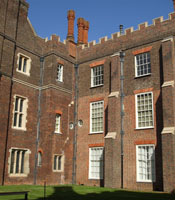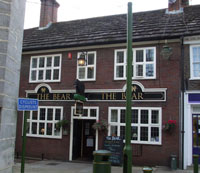
Part 6: Early working days - More about plumbing
The third of the Magi of plumbers was a horse of a very
different colour, one young Mark Ireland, a young, well set up
young man of about 30 who bounced along as if constructed of
“Sorbo”[1]. He had rather more
education than the average workman, kept his tools and his person
spick and span, used algebra and geometry for his calculation, was
painstaking and thorough in everything he touched. He was the first
of the hierarchy of Registered Plumbers I ever met, fond of the
fair sex, rather a Don Juan, “to one girl constant never”. Beside
being a craftsman in lead, he was in addition a first class sign
writer, but knew little if anything of how to prepare a ground for
sign writing with the result much of his well-designed and
beautifully executed sign writing went wrong quickly, faded, crazed
or blistered in no time. To my regret I had very little time with
Mark but sufficient to fire me with a desire to know more of his
craft. I remember his boasting that, in spite of all the foolish
jokes Punch indulged in about plumbers, the Plumbers Union –
Registered Plumbers - was the only trade union in the building
industry that insisted on a theoretical and practical examination
on would-be entrants. I was very impressed by this and, years
afterwards as a trade unionist in Chelsea, I tried to induce the
Painters and Decorators Union to insist on a similar test for their
craft. I got little or no support for my revolutionary proposal and
left the union in disgust having discovered that in the bar of a
certain little pub in Chelsea, I could if I so desired, find a
proposer and seconder for any man, be he butcher, baker or
candlestick maker, and providing I could pay for enough beer, find
men willing to claim they had known X as a decorator for many
years. This was sufficient to obtain full membership. It is only
fair to say things are not quite so simple now, but the plumbers
are still the only craft that insists on examination before a man
can call himself a registered plumber. With the result they have
lifted their craft from being a reproach and a byword to something
they are proud to belong to. And further, the wholehearted
acceptance of regulations of the Sanitary Institute and Surveyors
Institute by plumbers has, I think, had a salutary effect on the
health of the community. Of course, one cannot say the aesthetics
of a fine elevation are improved by plumbers’ pipes crawling all
over it, especially when the gentle plumber endeavours to make a
feature of them by “picking ’em out” in strong colour. I have
always contended that if pipes are painted, as of course they must
be if in iron, they should be light lead colour. I don’t know why
lead pipes and lead-coloured iron pipes seem inoffensive, but they
do. Witness the lead downpipes on Wren’s East and South elevations
at Hampton Court Palace which seem perfectly congruous and
satisfactory against the beautiful stone and brickwork. I once, at
the instigation of an architect old enough to know better, who was
being knocked off his usual balance by a foolish client, tried to
“swallow” the pipes on the elevation of a rather good Georgian
house by painting them the colour of the brickwork. The result may
be imagined, there being no such thing as the colour of the
brickwork. We did what we could to imitate the broken colour of
brickwork, even painting in the mortar joints, but the more we did
the worse it looked. Finally we painted them lead colour.
 A recent photograph of Hampton Court
Palace showing the downpipes painted just as Billy Hoad described
them.
A recent photograph of Hampton Court
Palace showing the downpipes painted just as Billy Hoad described
them.
About half way through my apprenticeship, just as I was starting to
know something about plumbing, I was drafted to the painters and
only occasionally touched plumbers’ tools again. The firm had a
considerable trade in country house decorating which they executed
more or less efficiently. It was customary to walk to and fro,
morning and night to any job, say 6 or 7, or even 8 miles distant,
usually in our own time. The hours were 6 a.m. to 5.30 in summer, 7
to 4.30 or 5 p.m. winter leaving off at 4 p.m. Saturdays. A skilled
craftsman’s wage, painter or plumber, was 6d per hour. This rate
went up by a halfpenny during my time with the firm. I think I got
hold of the rudiments of plain painting, distempering, paperhanging
etc. rarely doing anything of merit, but I was happy enough with
very little care for the future. The foreman painters were a mixed
lot, only one or two took any pains to teach me anything and of
course the “Guv’nor” never did. The head foreman, Alf
Mitchell[2], was rather a character.
He was elder brother of Fred (Dinah) Mitchell, the plumber. His
dress and general character was at least distinctive. I used to
think in appearance he was very like the pictures of Charles
Dickens. He had a long face, clean shaved except for a “goatee”
beard. This and a full head of hair was black as jet and he usually
wore black clothes and a wide brimmed soft black felt hat. Where he
bought these hats was a mystery. I, to this day, never saw another
like them. A similar hat is portrayed on the packet of “Richmond
Gem” cigarettes. Alf had a tremendous appetite for beer - I never
knew him in any way the worse for drink but he really loved it. The
first duty of the junior apprentices, having taken down and stowed
away the shutters (this had to be completed by 6 a.m.,) was to see
Alf and the Governor, collect 2d – they tossed as to who should pay
- and fetch a pint of beer in a bottle from the Bear in Market
Square. They would then drink this out of the bottle, passing it
one to the other, and send me for another pint, accusing me in fun
of having swiped a good pull of the first pint en route.
 The Bear Hotel, Horsham
The Bear Hotel, Horsham
Alf had another string to his bow; he was foreman “bearer” for
Beeching, our first class undertaker. He would frequently lose half
a day’s pay (2/6 and even 5/-) at a funeral which he called “going
gardening” or “planting”. He was certainly the most jocular,
devil-may-care undertaker’s man imaginable but when on display,
most discreet and circumspect. Old Beeching used to say his
customers liked being buried by Alf Mitchell. He did the job so
sedately and reverently, and yet, for all the reverent gardening he
had done, when he died he was buried like a dog.
- [1] Sorbo rubber was/is
a proprietary product used for window washing.
- [2] Alfred Mitchell,
born c. 1848, painter, lived with his family at 6 Park Terrace
West, Horsham (1891 English Census).
Share this
page (third party services may set cookies)